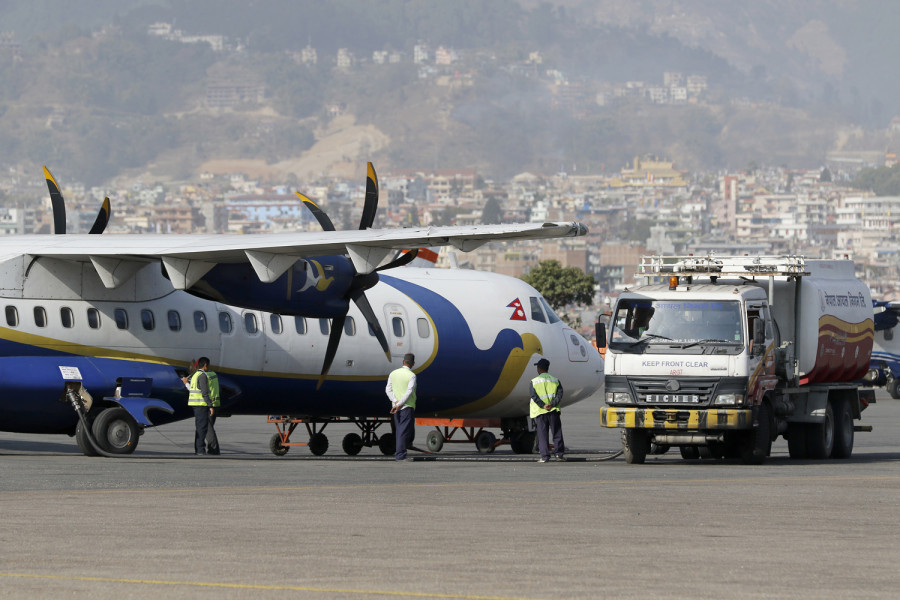National
High cost of jet fuel in Kathmandu airport is keeping foreign airlines away
Airlines pay $1 per litre to fuel up at Tribhuvan International Airport, compared to $0.55 per litre in Delhi, a new government report says.
Sangam Prasain
The high cost of aviation fuel at Kathmandu airport is affecting Nepal's tourism industry, a government committee has reported.
An eight-member panel headed by former government secretary Suresh Man Shrestha said in a report that the steep cost of fuel was keeping international carriers away, and urged the government to cut prices to put them on par with the global market to boost market confidence.
The government had formed the committee in the run-up to the Visit Nepal 2020 tourism campaign to study a number of issues, including uniformity in domestic airfares for foreigners and Nepali travellers, half-priced air tickets for travellers above 70 years of age, possible incentive packages for international airlines, and the cost of jet fuel in Nepal.
The panel submitted its report to Tourism Minister Yogesh Bhattarai on Saturday.
“If the prices are revised as per the rates in other South Asian countries, it will be a big relief for the country’s tourism industry. This will also send a positive message to the international market,” the report said.
A breakdown of the aviation fuel price sold to international airlines shows that the state-owned oil monopoly Nepal Oil Corporation charges Rs125.63 per litre of aviation fuel, which it buys for Rs59.07 per litre in Raxaul, India.
The retail price charged by the company after adding taxes and a hefty markup gives it a profit of Rs45 per litre, according to its website. Nepal Oil earns a fortnightly profit of more than Rs200 million on aviation fuel alone.
Airlines pay $1 per litre for aviation fuel at Tribhuvan International Airport, compared to $0.55 per litre in Delhi and $0.46 per litre in Hong Kong, Nepal Airlines said in its first quadrimester report submitted recently to the Tourism Ministry.
The national flag carrier said that fuel accounted for 30 percent of its operating costs, and that it was engaged in unfair competition with foreign airlines that get subsidised fuel.
“We are charging a high price for aviation fuel to subsidise household cooking gas, as per the government’s policy,” said Birendra Goit, spokesperson for Nepal Oil Corporation.
According to Goit, the corporation provides a subsidy of Rs128 per gas cylinder. “Any revision in the price of aviation fuel will depend on government policy,” he said.
“We have the most expensive aviation fuel in the world, and our airport is also among the most expensive in the world. This is because of the government’s mindset that everything needs to be taxed,” said an international airline official who asked not to be named.
The tourism industry recently submitted its wish list to the government urging it to slash fuel prices.
“The steep cost of jet fuel is one of the biggest concerns of the private sector as it has made air travel more expensive. In the context of Visit Nepal 2020, we have asked the government to consider this issue seriously,” said Krishna Hari Khatri, coordinator of the Visit Nepal 2020 programme implementation sub-committee.
The panel’s report also said that the state-owned fuel monopoly should review its cross-subsidy mechanism and adopt an auto pricing system that will ensure that aviation fuel prices are on par with other South Asian countries.
According to Nepal Oil Corporation, cooking gas consumption in Nepal has jumped to 37,000 tonnes per month from 12,000 tonnes five years ago. “In the context of Nepal becoming an energy surplus country, the government needs to launch a campaign to encourage people to consume electricity to reduce dependency on cooking fuel,” said the panel.
Rudra Singh Tamang, spokesperson for the Tourism Ministry, told the Post that the ministry was studying the proposal submitted by the private sector, and that it would soon come up with detailed packages containing incentives, promotional activities and some policy reforms, including fuel price adjustment.
Last fiscal year, Nepal imported 200,068 kilolitres of aviation fuel worth Rs13.75 billion.




 18.12°C Kathmandu
18.12°C Kathmandu














